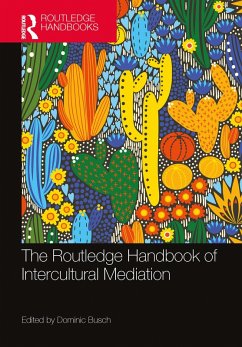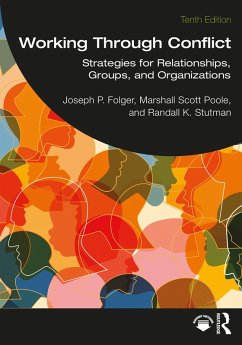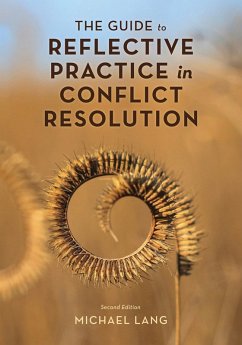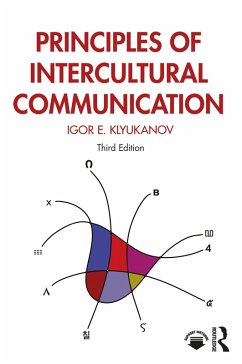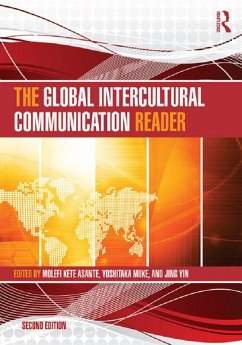"Today, the promises and pitfalls of multiculturalism, internationalism and globalization fill our headlines and our daily lives. As a result, there is an increasingly urgent need for peacemakers who can bring sensitivity, insight, evidence and skill to helping us navigate cultural differences, particularly those that are deep, invisible and sacred. This extraordinary book-The Routledge Handbook of Intercultural Mediation-is the most current and comprehensive resource for those intrepid mediators who serve as our guides in these tumultuous times. It will serve as the canon for this work, and a treasured resource for decades to come."
Peter T. Coleman, Professor of Psychology and Education, Director of the Morton
Deutsch International Center for Cooperation and Conflict Resolution at Columbia University, USA
"I cannot think of a better volume to help us make sense of the avalanche of intercultural 'nightmares' that we have been facing since early 2020-and before that! Dominic Busch has managed to put together a stimulating interdisciplinary and visionary compendium around intercultural mediation. Together with the authors they remind us that mediation does not just matter in times of emergencies but that it is pivotal to the very notion of interculturality at all times. The handbook retells the past of intercultural mediation, keeps us up-to-date with today's research and inspires us for the future. It should be on everyone's must-read list."
Fred Dervin,
Professor of Multicultural Education, University of Helsinki, Finland"The ideas and practices of intercultural mediation draw (or at least, should draw) from a wide variety of subject matter, fields and research traditions. A thorough academic treatment that crosses all these 'silos' is overdue, and
The Routledge Handbook of Intercultural Mediation addresses this gap in style. Its array of authors shows not only the expected level of expertise as well as the range of cultures and nations for such a work, but also a creative selection of fields and backgrounds. A list of the wide variety of research settings in this book might begin with the sciences, business, law, engineering, health care and linguistics, but it won't end there. This is an essential resource for anyone who is trying to understand what mediators can do, and how they can improve, in the complex interactions that make up intercultural work."
Christopher Honeyman
, Managing Partner at Convenor Conflict Management, Washington, DC, USA"A global pandemic, geopolitical ructions, social and economic inequality, and the rise of artificial intelligence provide stark reminders as to why intercultural mediation continues to matter. Learning to live well together is an enduring project of humanity, and understanding how to achieve this remains at the core of the concept and practices of intercultural mediation. This volume traces the evolution of this term and its various manifestations across diverse disciplines, paradigms and cultural worldviews. It represents a comprehensive, rich and compelling account of why intercultural mediation remains crucial for reciprocal engagement, justice and peace that must occur if we are to come together to face the great challenges that lie ahead."
Michelle Kohler,
Senior Research Fellow, Research Centre for Languages and Cultures, UniSA: Justice and Society, University of South Australia, Australia."This collection is particularly broad, being interdisciplinary and international as well as intercultural, including the topics covered, disciplines represented, and chapter authors, and thus should be relevant to an uncommonly large group of researchers, practitioners, and students."
Wendy Leeds-Hurwitz,
Director of the Center for Intercultural Dialogue and Professor Emerita at the University of Wisconsin-Parkside, USA"The new handbook weaves together interdisciplinary insights into the role of intercultural mediation in situations of conflict, dialogue, and more inclusive forms of community-building across varied cultural and organizational contexts. As well as contributing to debates about the meanings of culture and interculturality, the book provides a nuanced view of the field, laying out theoretical achievements and gaps and identifying promising practices."
Kirstie McAllum
, Department of Communication, Université de Montréal, Canada"A unique and stimulating collection of perspectives and insights on the interplay between mediation and culture. The authors come from a wide array of disciplines and cultures and explore a variety of situations at different levels of abstraction. This book can enrich anyone's ability to recognize, understand, and deal wisely with cultural influences in mediation-and other situations."
Leonard L. Riskin,
Visiting Professor, Northwestern University Pritzker School of Law, USA"Given the numerous wars between nations and violent conflicts within nations in today's world, it's obvious that neutral third parties trained in intercultural mediators are needed to help resolve such conflicts. In light of this,
The Handbook of Intercultural Mediation should be required reading for this important group of professional mediators."
Joseph A. Scimecca,
Professor of Sociology, George Mason University, USA"The
Routledge Handbook of Intercultural Mediation is a
tour de force. This work is a dazzling achievement written with great skill by a global community of scholars, and whose usefulness will have a long life. This book makes a significant contribution toward nonviolent social change, especially when placed against the backdrop of the current urgencies of global pandemic and the horrors of war. Beginning with an initial review of the literature, the stage is set for current and future researchers and practitioners to reexamine how they (we) have thought about culture, conflict, and community. As the reader is invited to assume roles of observer and participant, an impressive gathering of international contributors explores diverse aspects of intercultural mediation as a process of dispute resolution, a byproduct of translation and pedagogy, and as a communicative or socio-political aspiration. These authors present a wide range of approaches, disciplines, voices, and perspectives that highlight, yet bring cohesion to disparate epistemological and methodological tensions."
Mary Adams Trujillo,
Professor Emerita of Communication Arts and Conflict Transformation, North Park University, USA"Full of innovative approaches and observations, including alternatives to and critiques of a Western-only approach to mediation, this Handbook of Intercultural Mediation is a treatment of mediation that examines interculturality as it should be done- comprehensively, globally, and respectfully. This volume, appearing as the world struggles with the global impact of both epidemic and war, could hardly be more timely. It is unique in bringing both depth and breadth to the topic of intercultural mediation. Especially remarkable for the range of scales represented, from analyses of language to international politics, the volume is destined to be a touchstone for work in mediation, and for intercultural studies generally, for years to come."
Geoffrey White,
Professor Emeritus, Department of Anthropology, University of Hawai'i, USA





